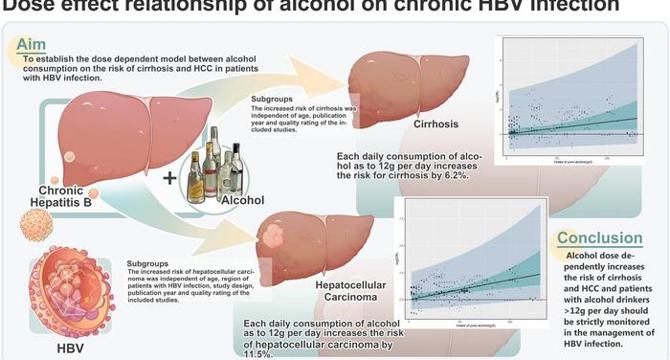Bioengineer
1w
25

Image Credit: Bioengineer
Meta-Analysis Reveals Dose-Dependent Link Between Alcohol Consumption and Increased Risks of Hepatitis B-Related Cirrhosis and Liver Cancer
- Researchers have conducted a meta-analysis aimed at understanding the relationship between alcohol consumption and two severe outcomes for patients with hepatitis B virus - cirrhosis and hepatocellular carcinoma (HCC).
- After reviewing 45 studies including 33,272 patients, it was found that patients who engaged in drinking were at a significantly elevated risk of developing cirrhosis and HCC, with an overall pooled odds ratio of 2.61 for cirrhosis and 2.27 for HCC among drinkers.
- The study found that each daily intake of 12 grams of alcohol correlated with an increment in the risk of cirrhosis by an alarming 6.2% and an increase in the risk of HCC by 11.5%.
- This pivotal finding indicates that even minimal alcohol consumption can considerably affect the liver health in those already compromised by hepatitis B virus, suggesting a pressing need for healthcare providers to advise patients accordingly.
- The researchers advocate for enhanced monitoring of HBV patients who consume alcohol, and to implement stricter guidelines regarding alcohol intake and its implications for liver health.
- Chronic alcohol consumption is known to impose additional stress on liver function, leading to an exacerbation of pre-existing liver conditions, highlighting how lifestyle choices can profoundly shape healthcare outcomes.
- The researchers note the associations are not mere statistical correlations; they reflect biological realities that connect alcohol metabolism with liver pathology.
- As healthcare practitioners absorb the implications of this study, it becomes essential to foster a greater awareness of the importance of responsible alcohol consumption, particularly in vulnerable populations.
- The study prompts further investigation into the biological mechanisms underlying the interactions between alcohol and HBV infection, to understand how these dynamics operate at a cellular level and inform preventive strategies or therapeutic interventions.
- The researchers highlight the need for multidisciplinary collaboration among healthcare professionals, who need to work together to identify at-risk patients and address their unique needs concerning alcohol consumption.
Read Full Article
1 Like
For uninterrupted reading, download the app